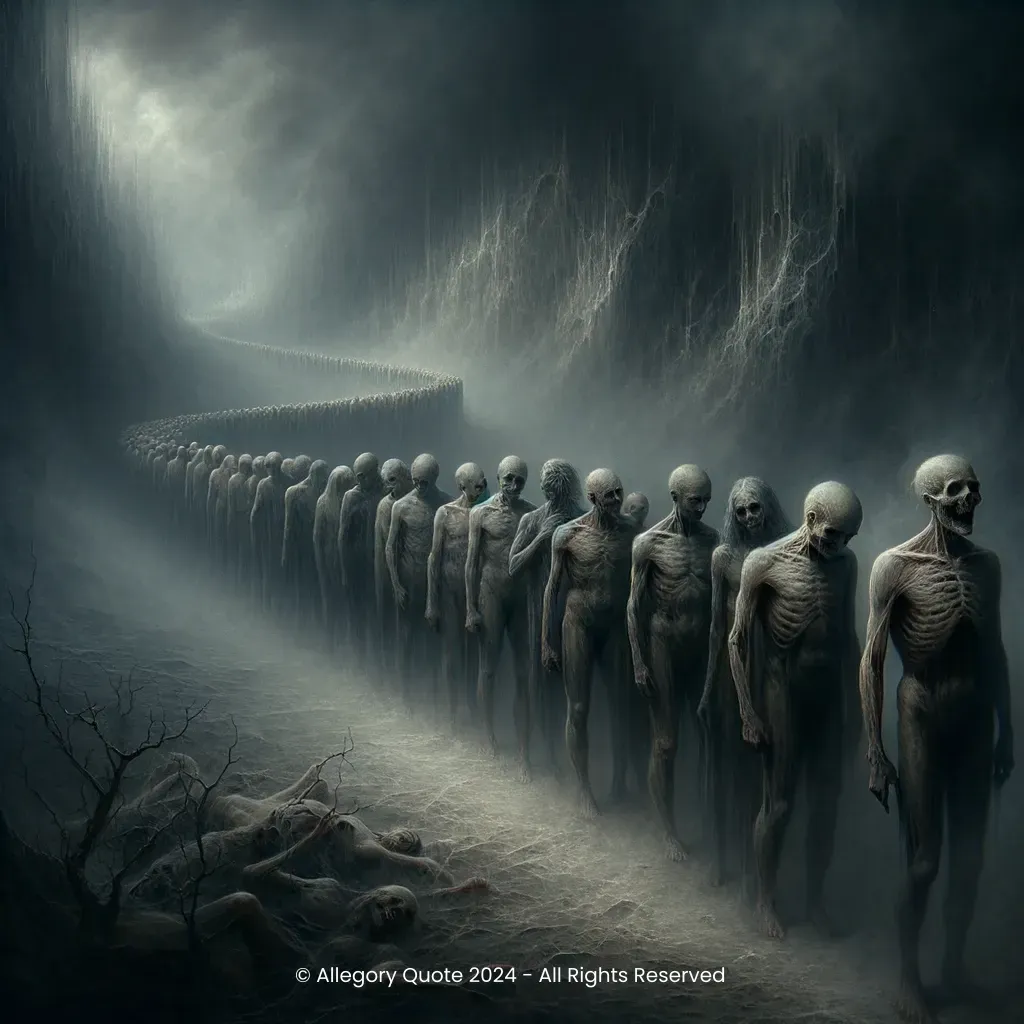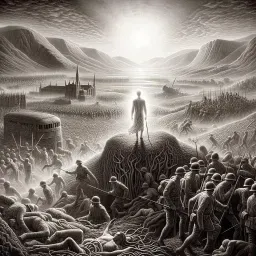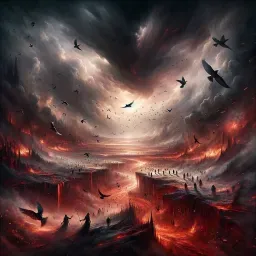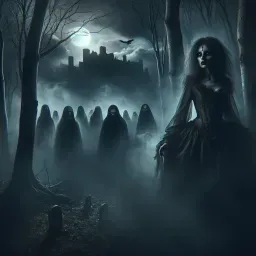”I saw such a long throng of people,
I would not have believed death had undone so many“

- Meaning
- The meaning of the phrase can be interpreted as an observation of the vast number of souls populating the vestibule of Hell. These are the so-called "neutral souls," those who in life never took a definitive stance, neither for good nor for evil. The idea of innumerable souls trying to align may represent their vain search for recognition and peace, a condition of eternal torment.
- Allegory
- The image visually represents an endless line of souls to convey the feeling of an innumerable multitude, reflecting Dante's idea of "innumera." Each soul is depicted as a tormented entity seeking recognition, symbolizing their condition of eternal uncertainty. The dark and foggy landscape in the background recalls the environment of Hell's vestibule, creating an atmosphere of despair and indeterminacy. Disturbing elements, such as thin shadows or vague figures, serve to intensify the sense of torment and endless penance. The use of these components makes visible the absence of choice and its consequence in Dante's vision.
- Applicability
- The message that can be drawn from this phrase is the importance of making decisions and taking a stand during one's life. Remaining neutral, avoiding responsibility, and not acting can lead to a state of unfulfillment and regret. These concepts apply to everyday situations where lack of action and commitment can result in disappointing or nonexistent outcomes.
- Impact
- This phrase has had a significant impact on Western literature and culture. Dante Alighieri's "The Divine Comedy" is one of the most studied and commented upon works in history, influencing numerous authors, philosophers, and artists. The image of the neutral souls and their fate has prompted deep reflections on the consequences of inaction and indifference.
- Historical Context
- In the "Divine Comedy," Dante wrote these verses between 1308 and 1320. During this period, medieval Europe was undergoing significant socio-political changes, with ongoing conflicts between factions like the Guelphs and Ghibellines. Dante himself, exiled from Florence, experienced these tensions personally, which profoundly influenced his work. The concept of "neutrality" reflects the politics of his era, where indifference could equate to betrayal.
- Criticisms
- The portrayal of the neutral souls has sparked criticism as it can be seen as a harsh condemnation of those who, for various reasons, did not act decisively. Some scholars have suggested that such a view is too drastic, considering that in certain situations, neutrality may stem from necessity or a complex context. However, Dante seems to want to emphasize that the absence of choice and action has significant consequences and deserves reflection.
- Variations
- There are no direct variations of this specific phrase, but the theme of indecision and the consequences of neutrality is present in many works and cultures. For example, the concept of inaction as a sin is also central in Eastern philosophies, such as in the Bhagavad Gita, where Krishna urges Arjuna to make courageous decisions on the battlefield, rejecting indifference.
-

In the midst of chaos, there is also opportunity.
-

He had already reached the place where the roar of water falling into the next circle could be heard, similar to the buzzing of beehives.
-

He who sows the wind shall reap the whirlwind.
-

Abandon all hope, ye who enter here.
-

There is no other life; why don’t you give your whole heart to this one?
-

And as the starlings are borne on their wings, in the cold season, in a broad and full troop, so does that blast bear the evil spirits along.
-

There the dreadful Erichtho writhed, who summoned back the shadows to their bodies.
-

And I: 'Master, what is so heavy that it makes them lament so strongly?'.
-

You will taste how salty another's bread is, and how hard it is to tread another's stairs up and down.
-

O imagination, that sometimes steals us so, from outside things, that we pay no attention, though someone might be present who hears a bell or a horn, within you!
-

Beyond the sphere that widest orbit swings, passes the sigh that leaves my heart below.
-

In His will is our peace.
No Comments